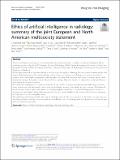Ethics of artificial intelligence in radiology: summary of the joint European and North American multisociety statement
Author(s)
Geis, J. R; Brady, Adrian; Wu, Carol C; Spencer, Jack; Ranschaert, Erik; Jaremko, Jacob L; Langer, Steve G; Kitts, Andrea B; Birch, Judy; Shields, William F; van den Hoven van Genderen, Robert; Kotter, Elmar; Gichoya, Judy W; Cook, Tessa S; Morgan, Matthew B; ... Show more Show less
Download13244_2019_Article_785.pdf (434.6Kb)
Publisher with Creative Commons License
Publisher with Creative Commons License
Creative Commons Attribution
Terms of use
Metadata
Show full item recordAbstract
Abstract
This is a condensed summary of an international multisociety statement on ethics of artificial intelligence (AI) in radiology produced by the ACR, European Society of Radiology, RSNA, Society for Imaging Informatics in Medicine, European Society of Medical Imaging Informatics, Canadian Association of Radiologists, and American Association of Physicists in Medicine.
AI has great potential to increase efficiency and accuracy throughout radiology, but also carries inherent pitfalls and biases. Widespread use of AI-based intelligent and autonomous systems in radiology can increase the risk of systemic errors with high consequence, and highlights complex ethical and societal issues. Currently, there is little experience using AI for patient care in diverse clinical settings. Extensive research is needed to understand how to best deploy AI in clinical practice.
This statement highlights our consensus that ethical use of AI in radiology should promote well-being, minimize harm, and ensure that the benefits and harms are distributed among stakeholders in a just manner. We believe AI should respect human rights and freedoms, including dignity and privacy. It should be designed for maximum transparency and dependability. Ultimate responsibility and accountability for AI remains with its human designers and operators for the foreseeable future.
The radiology community should start now to develop codes of ethics and practice for AI which promote any use that helps patients and the common good and should block use of radiology data and algorithms for financial gain without those two attributes.
Date issued
2019-10-01Department
Massachusetts Institute of Technology. Department of Linguistics and PhilosophyPublisher
Springer Berlin Heidelberg
Citation
Insights into Imaging. 2019 Oct 01;10(1):101
Version: Final published version